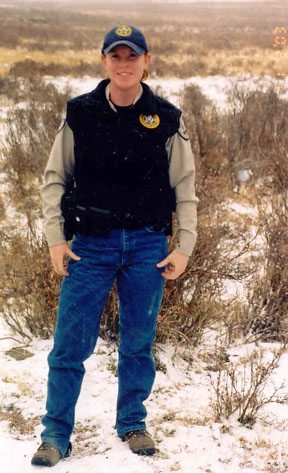|
Web Exclusives: Alumni Spotlight
April 7, 2004: Policing
the wild On any given day Windi Lassiter ’00, a newly commissioned wildlife officer north of Boulder, Colorado, might respond to calls about sightings of mountain lions, inspect hunting and fishing licenses, or teach children about safe interaction with wildlife. Armed with handgun, pepper spray, and baton, Lassiter is a certified peace officer; she fosters the mutually beneficial coexistence of humans and wildlife. In a state that is developing rapidly, wildlife officers also attend meetings of local governmental bodies to educate municipal planners and developers about land use and the impact on wildlife of proposed development. Lassiter calls this role being “the voice for wildlife in our district.” As more of Colorado’s previously undeveloped areas become populated, the encroachment on wildlife habitat threatens the survival of wild plants and animals; it also creates problems such as black bears’ looking for food around humans. Lassiter sums it up: “There are a lot of concerns — a lot of conflict between humans and wildlife — as Colorado is growing. Two-way communication is important.” Western wildlife management seems a natural fit for Lassiter, a Colorado native and an ecology and evolutionary biology major at Princeton. “Growing up on a farm where I did, I ran across a lot of wildlife — seeing elk and bears, hearing mountain lions — and I’ve had an interest in biology ever since I was small. Then, when I was in high school, I read a book about [EEB] Professor Peter Grant. … A lot of my heroes were at Princeton.” Lassiter’s Princeton thesis was an animal behavior study of feral horses off the coast of North Carolina, where she collected her own data and completed a scientific study, an experience that gave her both training and appreciation for the data collection aspect of her current position. She must be alert to any evidence of spreading disease among wildlife, for example, to help protect both animals and humans. “A wildlife officer is expected to be a biologist and to be able to work with people, so it fits right in with my personality and interests,” Lassiter says. In addition to her biology degree, she was required to complete nine months of training to become a wildlife officer. Her classes focused on areas such as western water rights and the diseases prevalent among wildlife in Colorado, including West Nile virus and chronic wasting disease. Lassiter also had to go through 14 weeks of training at the police academy. She had a week of scenario-based officer survival school and studied principles of crime scene investigation, pertaining to poaching cases. Today she is certified to enforce most state laws. Lassiter was one of two women among the 11 trainees. She estimates that gender ratio to be typical; about 20 percent of the approximately 150 wildlife officers in the state are female. As far as she knows, however, she is the only Ivy League graduate among the officers, male or female. The aspect of her work that she is “most passionate about” is “how people and wildlife can coexist. I think the work wildlife officers do is so very important, especially if Colorado continues to grow as it is. … Wildlife officers can look at both sides and make some kind of happy medium work.” She seems hopeful that providing the public with better information about wildlife will make their interactions with it good ones; she also knows, from childhood experience with bear damage to her family farm, the valuable support that wildlife officers provide when the encounters are not positive. Lassiter’s own experience makes her hope that other Princeton
students and young alumni will consider less common paths in their
careers. “I never dreamed that I’d be going to a police
academy or be in this role. It’s a nontraditional thing for
someone coming out of an Ivy League school to do. Princeton prepared
me very well to do it, though, and I’m glad I did it.” By A. Melissa Kiser ’75 Melissa Kiser is director of public relations at The Pennington School.
Home Current
Issue
Web Exclusives: Headlines - PawPlus - Features Tooke's Take - Varsity Typewriter - Inky Dinky Do Raising Kate - On the Campus - Comparative Life - More... PAW Online Archives - Print Archives - Advertising Info - Reader Services Search the Site - Contact PAW Princeton University - Alumni Links - Alumni Council - Your Class Secretary |
||

